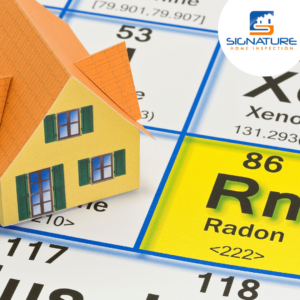Radon is an invisible, odorless gas that can pose serious health risks if present at high levels in your home. In Orange County, where many houses are built on varied terrain, radon testing is crucial in ensuring your family’s safety. Whether you’re a homeowner or considering buying a property, understanding the importance of radon testing in Orange County is essential for protecting your health and investment. This blog will guide you through radon testing in Orange County: what you need to know.

Radon Testing in Orange County: What You Need to Know
What is Radon?
Radon is a naturally occurring radioactive gas produced by the decay of uranium in soil, rock, and water. It can seep into homes through cracks in the foundation, walls, and floors, accumulating to dangerous levels over time. Because radon is colorless and odorless, the only way to detect it is through specialized testing. Prolonged exposure to high levels of radon is the second leading cause of lung cancer in the United States, making radon testing a critical health measure for all homeowners.
Why Radon Testing is Essential in Orange County
While radon levels can vary significantly depending on location, radon is not limited to specific geographic areas. Orange County is not immune to radon exposure due to its diverse landscape and soil types. Several factors make radon testing essential in this region:
- Varied Soil Composition
The geological composition of Orange County includes a mix of soil types, some of which may contain higher levels of uranium. Homes built on or near these areas are at a greater risk of radon infiltration. Testing ensures you know if your home is affected, allowing you to take action if necessary. - Construction Practices
Older homes and even some newer constructions in Orange County may have foundations with cracks or other vulnerabilities that allow radon to enter. Radon can penetrate through the smallest openings, making testing vital regardless of your home’s age or condition. - Climate and Ventilation
The warm climate in Orange County often leads homeowners to keep windows and doors closed, particularly in the summer when air conditioning is in use. This can trap radon inside, increasing its concentration and the risk of exposure. Radon testing helps identify these risks so you can make informed decisions about mitigation. - Health and Safety Concerns
Lung cancer is a significant health risk associated with radon exposure. Ensuring that Orange County residents’ homes are radon-free provides peace of mind and protects their family’s long-term health. Given that radon is invisible and odorless, testing is the only way to confirm that their indoor air quality is safe.
The Radon Testing Process
Radon testing is straightforward and can be done using short-term or long-term methods, depending on your needs. Here’s an overview of how the process works:
- Short-Term Testing
Short-term tests typically last between 2 and 7 days. They are a quick way to get an initial reading of radon levels in your home. These tests involve placing a radon detector in the lowest living space of your home, such as the basement or ground floor, where radon is likely to accumulate. - Long-Term Testing
Long-term tests measure radon levels over 90 days or more. This method provides a more accurate representation of your home’s average radon levels throughout different seasons. Long-term testing is recommended if you want a comprehensive understanding of your home’s radon exposure. - Professional Testing
While DIY radon testing kits are available, hiring a professional radon inspector ensures accuracy and reliability. Professionals use advanced equipment to detect radon and provide detailed reports on the findings. This option is significant if you buy or sell a home, as professional results are more widely accepted in real estate transactions. - Interpreting Results
Radon levels are measured in picocuries per liter of air (pCi/L). The Environmental Protection Agency (EPA) recommends action if your radon levels are at or above 4.0 pCi/L. If your test results indicate elevated radon levels, mitigation measures should be implemented to reduce exposure.
Mitigating Radon in Your Home
If radon testing reveals elevated levels in your Orange County home, don’t panic—effective mitigation solutions are available. Here’s how radon mitigation works:
- Ventilation Systems
The most common method of reducing radon levels is installing a radon mitigation system, which typically involves a vent pipe and a fan that draws radon from beneath the house and expels it outside. This prevents radon from entering your living spaces and significantly reduces indoor levels. - Sealing Cracks and Openings
Sealing foundation cracks and gaps can help reduce radon entry, but it is usually used with a ventilation system rather than as a standalone solution. Professional radon mitigators will assess your home and recommend the best approach based on your situation. - Regular Testing
Regular radon testing is essential to ensure levels remain low even after installing a mitigation system. Radon levels can fluctuate due to changes in soil, construction, or environmental factors, so ongoing testing helps maintain a safe environment.
Radon Testing in Real Estate Transactions
Radon testing is increasingly becoming a standard part of real estate transactions in Orange County. Whether you’re buying or selling a home, understanding the role of radon testing in real estate is crucial:
- For Home Buyers
As a buyer, requesting a radon test as part of your home inspection ensures you’re not unknowingly purchasing a property with a radon problem. If elevated radon levels are detected, you can negotiate for the seller to address the issue before closing. - For Home Sellers
If you’re selling a home, conducting a radon test before listing the property can be a proactive move. Providing potential buyers with a clean radon report or addressing any issues upfront can increase your home’s appeal and speed up the sale process. - Disclosure Requirements
In some states, sellers must disclose known radon levels to potential buyers. While this is not a legal requirement in California, transparency about radon testing and mitigation can foster trust and reduce complications during the sale process.
Why Choose Professional Radon Testing?
When it comes to radon testing in Orange County, accuracy is critical. Here are some reasons why professional radon testing is the best option:
- Expertise and Equipment
Professional radon inspectors use sophisticated equipment that provides more accurate results than DIY kits. Their expertise ensures the test is conducted correctly, accounting for placement, timing, and environmental conditions. - Reliable Results
Real estate agents, buyers, and sellers recognize and trust professional testing. An experienced radon report adds credibility to the findings, which can be crucial during real estate transactions or when negotiating with contractors for mitigation work. - Peace of Mind
Hiring a professional gives you confidence in the results. You know that your home has been thoroughly tested and that any necessary mitigation steps are based on accurate data. This peace of mind is invaluable, especially concerning something as critical as your family’s health.
Conclusion: Protect Your Health with Radon Testing
Radon is a silent threat that can have severe consequences for your health if left unchecked. Regular testing is essential in Orange County, where environmental factors and construction practices can contribute to radon exposure. Whether you’re a homeowner, buyer, or seller, understanding the importance of radon testing and taking appropriate action can protect your investment and, most importantly, your health.
Are you concerned about radon levels in your home? Schedule a professional radon test with Signature Home Inspection today and ensure your family’s safety. For expert digital marketing strategies that help grow your business, contact Hoopla Digital Marketing. Let us boost your online presence and drive results. Visit our website to learn more and get started!

